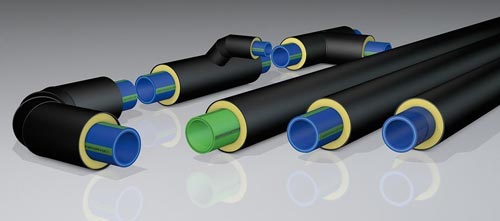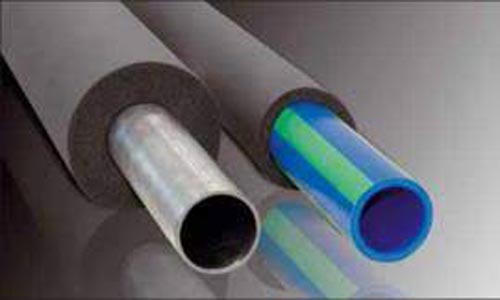"Insulating for Efficiency: The Advantages of Polyethylene Pipe Insulation"
As we strive to maximize the efficiency of our homes and buildings, it's important to remember the impact that proper insulation can have on our energy consumption.
Polyethylene pipe insulation offers a cost-effective and versatile solution to maintaining consistent temperatures and minimizing heat loss.
By investing in quality insulation, we not only save on our utility bills but also contribute to a more sustainable future. So let's dive into the advantages of polyethylene pipe insulation and discover how it can benefit your space.
The benefits of using polyethylene pipe insulation
Polyethylene pipe insulation offers several benefits, including:
-
Energy savings: Insulating pipes with polyethylene can help to reduce heat loss from hot water pipes and prevent condensation on cold water pipes. This can lead to lower energy consumption and cost savings on energy bills.
-
Prevents pipe damage: Insulating pipes with polyethylene can help prevent damage to pipes due to freezing or extreme temperatures. This can help to reduce the risk of burst pipes and the associated repair cost.
-
reduction: Polyethylene pipe insulation can help to reduce noise caused by water flowing through pipes, making it ideal for use in buildings where noise reduction is important.
-
Improves water quality: Polyethylene pipe insulation can help to prevent the growth of bacteria and other microorganisms in pipes, which can improve the overall quality of the water.
-
Easy to install: Polyethylene pipe insulation is easy to install and can be done by DIYers, making it an affordable option for homeowners and businesses.
-
Durable and long-lasting: Polyethylene pipe insulation is durable and long-lasting, with a lifespan of up to 50 years. This can help to reduce maintenance and replacement costs over time.
In general, polyethylene pipe insulation is a cost-effective and practical solution for improving the energy efficiency, durability, and performance of water pipes.

Choosing the right polyethylene pipe insulation
When selecting the right polyethylene pipe insulation, there are several factors to consider, including:
-
Insulation thickness: The thickness of the insulation will depend on the diameter of the pipe and the temperature of the water flowing through it. Thicker insulation is needed for higher-temperature water and larger-diameter pipes.
-
Material density: The density of the insulation material affects its ability to insulate against heat loss and prevent condensation. Higher-density materials provide better insulation.
-
Material type: Polyethylene pipe insulation is available in various types of materials, such as closed-cell or open-cell foam. Closed-cell foam has a higher density and provides better insulation, while the open-cell foam is more flexible and easier to install.
-
Vapor barrier: For pipes that carry cold water, a vapor barrier is necessary to prevent condensation on the insulation. The vapor barrier should be made of a material that is resistant to moisture.
-
Fire rating: If the pipe insulation is installed in an area where there is a risk of fire, the insulation should have a fire rating that meets local building codes.
-
Cost: The cost of the insulation will depend on the thickness, density, and type of material. Higher quality insulation may be more expensive but can provide better insulation and last longer.
By considering these factors, you can select the right polyethylene pipe insulation that meets your needs and provides optimal performance.
Comparing polyethylene pipe insulation to other types of insulation
Polyethylene pipe insulation is one of several types of insulation available for use in pipes. Here is a comparison of polyethylene pipe insulation to other common types of insulation:
-
Fiberglass insulation: Fiberglass insulation is a commonly used insulation material that is also used for insulating pipes. It is lightweight, easy to install, and relatively inexpensive. However, fiberglass insulation can absorb moisture, which can reduce its insulating properties over time.
-
Mineral wool insulation: Mineral wool insulation is another commonly used insulation material for pipes. It is made from natural or synthetic minerals and is fire-resistant, moisture-resistant, and provides good sound insulation. However, it can be more expensive than other types of insulation.
-
Rubber insulation: Rubber insulation is a flexible insulation material that is commonly used for pipes. It is durable, moisture-resistant, and provides good thermal insulation. However, it can be more expensive than other types of insulation.
Compared to these other types of insulation, polyethylene pipe insulation has several advantages. It is lightweight, easy to install, and has excellent moisture resistance, which helps to prevent condensation on cold water pipes.
Additionally, polyethylene pipe insulation is more affordable than some other types of insulation, making it a cost-effective option for many applications.
Overall, the choice of insulation material will depend on the specific needs of your project, including the diameter of the pipe, the temperature of the water, and the environment in which it will be installed.

Is in general polyethylene pipe insulation a good idea or not?
In general, using polyethylene pipe insulation is a good idea. It provides several benefits, including energy savings, preventing pipe damage, noise reduction, improved water quality, and being easy to install. Additionally, polyethylene pipe insulation is a cost-effective solution that can help to reduce maintenance and replacement costs over time.
However, as with any insulation material, the effectiveness of polyethylene pipe insulation will depend on several factors, such as the thickness of the insulation, the material density, and the temperature of the water flowing through the pipe. It is important to choose the right type of insulation for your specific needs and to ensure that it is installed correctly to achieve maximum effectiveness.
Overall, polyethylene pipe insulation is a practical and cost-effective solution for improving the energy efficiency and durability of water pipes. It is a good idea for many applications, but it is important to consider the specific needs of your project and select the appropriate insulation material accordingly.

Final Thoughts
Polyethylene pipe insulation is a cost-effective and practical solution for improving the energy efficiency, durability, and performance of water pipes. It provides several benefits, such as energy savings, prevention of pipe damage, noise reduction, improved water quality, and easy of install. However, it is important to choose the right type of insulation for your specific needs and ensure that it is installed correctly to achieve maximum effectiveness. Overall, using polyethylene pipe insulation is a good idea for many applications, but the choice of insulation material will depend on the specific needs of your project.
If you liked this post please let us know in the comment section and tell us your thoughts on this topic.